
Leandro Campanari (October 20, 1859 - April 22, 1939) [1] [2] [3] [Note 1] was an Italian violinist, conductor, composer and music teacher, [3] brother of cellist and baritone Giuseppe Campanari. [2]

Leandro Campanari (October 20, 1859 - April 22, 1939) [1] [2] [3] [Note 1] was an Italian violinist, conductor, composer and music teacher, [3] brother of cellist and baritone Giuseppe Campanari. [2]
Leandro Campanari was born in Rovigo, Italy on 20 October 1859. He began studying at a very early age and was sent by the city of Venice to the Musical Institute of Padua when nine years old. [4] At 12 he toured Italy as a violinist prodigy, and to London where he played under Julius Benedict. [2] Later he was associated with Franco Faccio [2] and Antonio Bazzini. [5] At 15 he entered the Conservatory of Music in Milan and studied the violin, harmony, counterpoint and conducting with the most eminent teachers of that institution. He graduated at 19 to go to England with an orchestra, where he had a very successful season. [Note 2] He then toured Italy and France as a virtuoso before establishing his role as a conductor. [3]
He also taught privately and one of his pupils was the New York violinist Persis Bell, a protégée of Julius Eichberg. [6] They married in 1880. [7] [8]
In 1881 he moved to America as a soloist with the Boston Symphony Orchestra, and featured in many concerts throughout the United States. He returned to Europe, but then back to America, where he remained for three years as the head of the Violin School at the New England Conservatory of Music in Boston. He also assumed the direction of the music at the Church of the Immaculate Conception and brought out many important sacred works for the first time in that city.
After his service in Boston, Campanari returned to Italy in 1886 and formed the Campanari String Quartet, [Note 3] which toured with great success for two years. During that time many notable composers, including Puccini, Catalani, Sgambati, Bazzini, Arturo Vanbianchi, Frugatta, Bossi and Guglielmo Andreoli the Younger composed music especially for the Campanari Quartet.
He returned to the United States in 1890 to become professor of violin at the Cincinnati College of Music, succeeding Schradieck, and remained in that position for six years. [3] [9]
Returning to Italy in 1896, he divided his time between Milan, Paris and London. [2] He gave a series of symphony concerts at La Scala, [10] and the cycle of Beethoven symphonies at the Lyric Theatre in Milan. [Note 4] The orchestra then went on tour, meeting with pronounced success. The next important engagement of Campanari and his orchestra was in London, at the Imperial Institute, for a long and very successful season of nearly four months. [3] In Milan he introduced several first performances in Italy of now-famous orchestral works. He also conducted opera in Milan, Venice and Genoa. [2] ·While in Genoa, he was given the opportunity to play Paganini's violin, Il Cannone Guarnerius. He played Gounod's Ave Maria and Liszt's Campanella . [11]
In 1907, he appeared in New York City as one of the opera conductors of Hammerstein's Opera Company. [2] He also conducted the Philadelphia Symphony Orchestra for a short time. [12] With the same organization he appeared in Reading, Trenton, Wilmington, Washington and Baltimore for performances of Beethoven's "Ninth Symphony." He also conducted in Los Angeles and San Francisco. Owing to the serious illness of his wife, Persis Bell, an American lady and once a violinist of note, Campanari removed to California, but after her recovery, he resumed his work as a virtuoso and a conductor. [3]
Leandro Campanari's acquaintance with Verdi extended over a period of many years. As a youth he played in an orchestra conducted by the composer, and Verdi's last work was first given under the direction of Campanari. The conductor's brother, Umberto Campanari, a lawyer, [13] was one of the executors of the estate of Verdi. Leandro wrote an intimate piece about his relationship with the master for The Etude (1910). [3]
Campanari moved to San Francisco in 1907, where he became director of the California Conservatory of Music. [4] He taught both violin and voice. [14] [15]
Campanari composed many English songs and three text-books for violin playing. [3]
Campanari died in San Francisco in 1939. He is buried in Mountain View Cemetery, Oakland, California. [16]
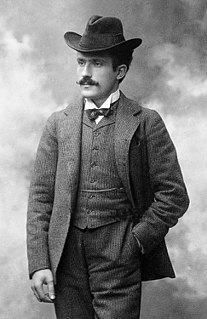
Arturo Toscanini was an Italian conductor. He was one of the most acclaimed and influential musicians of the late 19th and early 20th century, renowned for his intensity, his perfectionism, his ear for orchestral detail and sonority, and his eidetic memory. He was at various times the music director of La Scala in Milan and the New York Philharmonic. Later in his career he was appointed the first music director of the NBC Symphony Orchestra (1937–54), and this led to his becoming a household name through his radio and television broadcasts and many recordings of the operatic and symphonic repertoire.
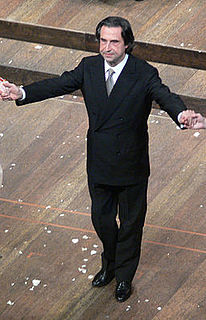
Riccardo Muti, is an Italian conductor. He currently holds two music directorships, at the Chicago Symphony Orchestra and at the Orchestra Giovanile Luigi Cherubini. Muti has previously held posts at the Maggio Musicale in Florence, the Philharmonia Orchestra in London, the Philadelphia Orchestra, the Teatro alla Scala in Milan, and the Salzburg Whitsun Festival.
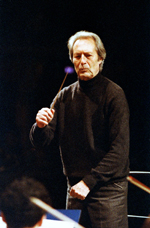
Carlo Maria Giulini was an Italian conductor. From the age of five, when he began to play the violin, Giulini's musical education was expanded when he began to study at Italy's foremost conservatory, the Conservatorio Santa Cecilia in Rome at the age of 16. Initially, he studied the viola and conducting; then, following an audition, he won a place in the Orchestra dell'Accademia Nazionale di Santa Cecilia.

Alfredo Catalani was an Italian operatic composer. He is best remembered for his operas Loreley (1890) and La Wally (1892). La Wally was composed to a libretto by Luigi Illica, and features Catalani's most famous aria "Ebben? Ne andrò lontana." This aria, sung by American soprano Wilhelmenia Fernandez, was at the heart of Jean-Jacques Beineix's 1981 film Diva. Catalani's other operas were much less successful.

Riccardo Chailly is an Italian conductor. He is currently music director of the Lucerne Festival Orchestra, since 2016, and music director of La Scala, since 2017. Prior to this, he held chief conducting positions at the Gewandhausorchester (2005–2016); the Royal Concertgebouw Orchestra (1988–2004); the Berlin Radio Symphony Orchestra (1982–1988); and the Teatro Comunale of Bologna (1986–1993). He was also the first musical director of the Orchestra Sinfonica di Milano Giuseppe Verdi (1999–2005) and principal guest conductor of the London Philharmonic Orchestra (1983–1986). Among the world's leading conductors, in a 2015 Bachtrack poll, he was ranked by music critics as the world's best living conductor.
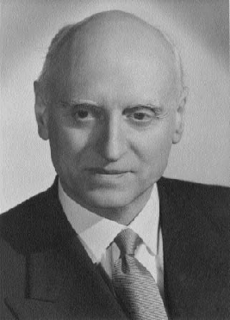
Victor de Sabata was an Italian conductor and composer. He is widely recognized as one of the most distinguished operatic conductors of the twentieth century, especially for his Verdi, Puccini and Wagner.

Antonio Bazzini was an Italian violinist, composer and teacher. As a composer his most enduring work is his chamber music which has earned him a central place in the Italian instrumental renaissance of the 19th century. However, his success as a composer was overshadowed by his reputation as one of the finest concert violinists of the nineteenth century. He also contributed to a portion of Messa per Rossini, specifically the first section of II. Sequentia, Dies Irae.
Grzegorz Nowak is a Polish conductor. He has served as music director of the Polish National Opera, the Edmonton Symphony Orchestra, the SWR Radio Orchestra in Kaiserslautern, Germany), and Sinfonia Helvetica and festival Musique and Amitié in Switzerland. He is the Principal Associate Conductor of the Royal Philharmonic Orchestra in London.
Franco Ghione (1886–1964) was an Italian conductor and violinist. He graduated from the Parma Conservatory and became a violinist for the Parma Theatre and the Augusteo in Rome. He began a conducting career in 1913 and conducted in many opera houses, including La Scala. He conducted the Detroit Symphony Orchestra from 1936 to 1940, where it was said that, because he could not speak English, he "would explode in frustration" when his instructions were not understood.

Roberto Abbado is an Italian opera and symphonic music conductor. Currently he is Artistic Partner of The Saint Paul Chamber Orchestra. In 2015 he has been appointed Music Director of Palau de les Arts Reina Sofia in Valencia, Spain. From 2018 he's Music Director of the Festival Verdi in Parma. Previously he held the position of Chief Conductor of Münchner Rundfunkorchester.
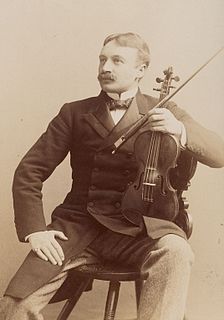
Tymoteusz "Timothee" Adamowski was a Polish-born American conductor, composer, and violinist. Born in Warsaw, he studied in that city's conservatory, later moving on to further studies in Paris. He served as the first conductor of the Boston Pops Orchestra. Tymoteusz was the uncle of Polish Olympic hockey player Tadeusz Adamowski and the humanitarian Helenka Adamowska Pantaleoni.
Giovanni Bolzoni was an Italian composer and violinist, who is known for his Minuet for String Orchestra.

Sergey Alexandrovich Krylov is a Russian and Italian violinist and conductor.
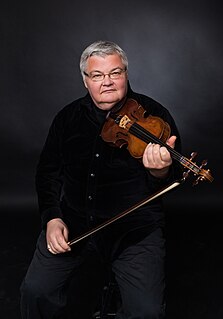
Sergei Stadler is a Russian violinist and conductor. He is currently Artistic Director and Chief Conductor of the Saint Petersburg Symphony Orchestra.
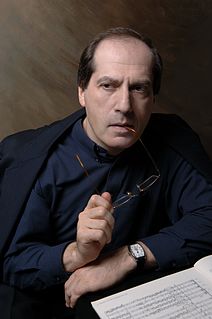
Pavel Leonidovich Kogan is a Russian violinist and conductor who currently leads the Moscow State Symphony Orchestra.

Marcello Abbado was an Italian pianist, composer, conductor and academic teacher. His compositions include several orchestral works, two ballets, numerous pieces for solo piano, and chamber music. As a pianist, he played in major concert halls of the world. He taught composition at several conservatories, ultimately at the Giuseppe Verdi Conservatory. In 1989 he was awarded the Gold Medal for Meritorious Culture and Art by the Government of Italy.

Giuseppe Campanari was an Italian-born operatic baritone and cellist. He later became an American citizen.

Ali (Alexander) Rahbari is an Iranian composer and conductor, who has worked with more than 120 European orchestras, including the Berlin Philharmonic.
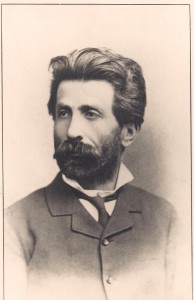
Guglielmo Andreoli was an Italian pianist, music teacher and composer.
Alvise Casellati is an Italian conductor.